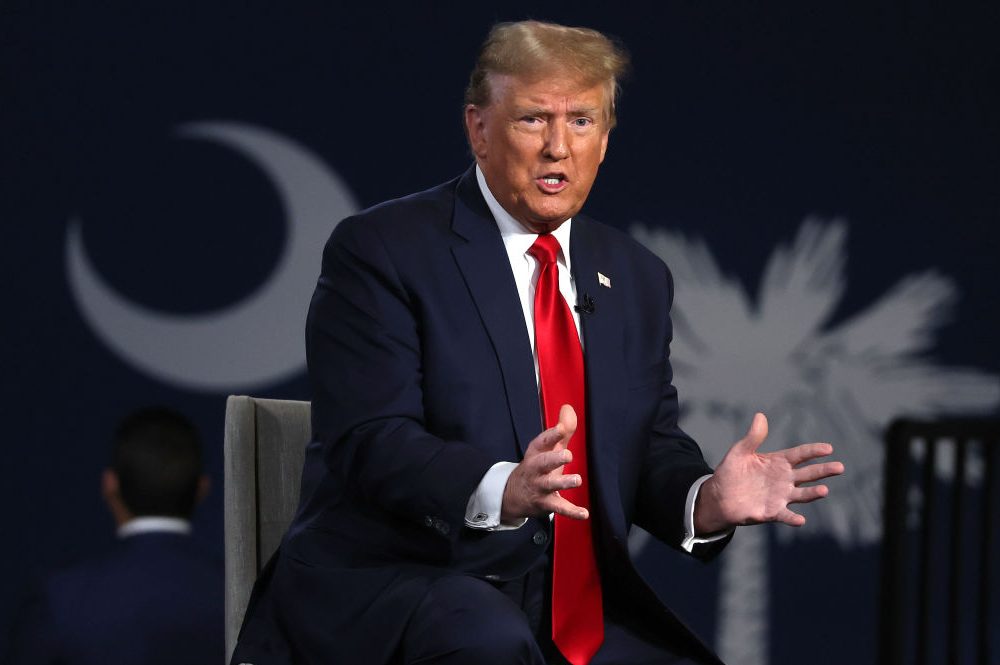Greenville, South Carolina
I’ve now seen three versions of Donald Trump in the state where I grew up. In 2016, he was the impassioned underdog, battling against Marco Rubio and Ted Cruz in a state many in the national media assumed would decide against a New York limousine liberal and stop the Trump Train in its tracks. In 2020, he was the prideful, over-the-top champion of the conservative cause — he bellowed through a sweaty speech, calling out to the universal Republican endorsements in the audience, playing the hits to a stadium crowd mere weeks before the word “coronavirus” was known to the average American. And now in 2024, in the middle of a Greenville conference center room carefully prepared for a Laura Ingraham-hosted town hall, he is exhibiting a manner you rarely see from him: he is subdued.
The questions from Ingraham are pointed. (I add the note that I am a guest on her show, and a Fox News contributor, so I am biased.) She raises the big question early on: if it is true that Democrats are so good at cheating the early ballot/mail-in system, how do you expect to win? The implication, obviously, being that his continued complaints about these things do nothing to change the policy, and set up an obvious excuse should he lose in 2024. Trump answers: “Swamp them.” And that is his favored approach, as simplistic as it can be — win by so many that he cannot be denied, which he maintains the polls show now even though they do not (in the latest Fox poll, he is within the margin of error in Michigan, for example — a state he absolutely must win, especially if Pennsylvania is lost).
But still, he is subdued. When a questioner from the audience raises the issue of Ukraine aid, Trump handily pivots to flattery, complimenting the man on his common sense, and explicitly eschewing the labels of conservative and liberal. But then he dodges the question, saying that instead the need is for Europe to pay its fair share, as he demanded before and will demand again, citing varying amounts that would meet that obligation. He decries giving foreign aid to nations that hate us. He never says we should not be sending money to Ukraine, or that they hate us, or that they are corrupt. In Washington, it’s the most blatantly known fact that Trump is closer to the majority of the Senate than he is to J.D. Vance. And why wouldn’t he be? He remembers the Cold War, and he likes devastating responses, not running away from a fight like wussy men. He dismisses Nikki Haley not over neocon tendencies, but because she could never hope to beat him. His natcon supporters can only hope he fights the way they wish — until then, he’s not interested in their intellectual thinkpieces.
His answer when confronted with Nancy Pelosi’s latest near-incoherent claims of Russian compromise are perhaps the most effective recitation against such absurdities: that he had hard sanctions against Russia and Putin, that he killed the Nordstream pipeline and Joe Biden revived it, and that he took a destructive policy agenda against Russian proxies in Iran when Biden gave them cash and enabled them. There will be no 2024 debates, the Biden White House will be sure of that, but this was an answer that would have been impossible to rebut on stage.
Ingraham challenged Trump on his response to the death of Alexei Navalny, deemed insufficient and narcissistic by many on MSNBC, whose Just for Men voice of moral authority Joe Scarborough has done literally nothing about Navalny in recent years — the last time he mentioned him was in 2020, before Joe Biden was sworn in. (To Joe, the only useful Russian is a dead one who can be weaponized against Donald Trump.) Trump’s response was more measured than his Truth Social post, calling Navalny a brave man, who died for his bravery, and would have been alive if he had stayed outside Putin’s orbit. But then he compared himself to Navalny again, albeit on a lesser scale, for his persecution at the hands of New York judges and Georgia prosecutors. For his fans, who probably had not heard much of the Russian dissident prior to last week, it played.
But still, he is subdued. Perhaps this is just his age. His voice has changed, his mannerisms are more restrained, he seems somehow less goofy and more serious. Perhaps that’s the weight of all these cases hanging over his head. Perhaps it’s because he knows this is, realistically, the last time he can stand for the office and restore his status as a winner in the minds of all. Or maybe, just maybe, it’s a recognition that figures like him in American history rarely get happy endings. Either you win, or you go down — and you go down hard. He’s fighting for his life. But also, for today at least: he’s winning.


























Leave a Reply